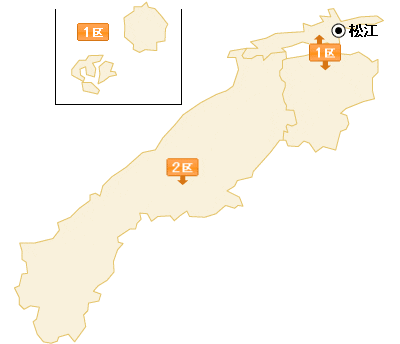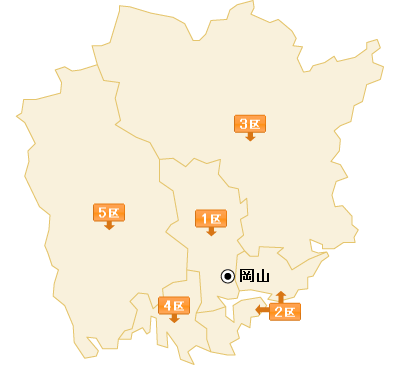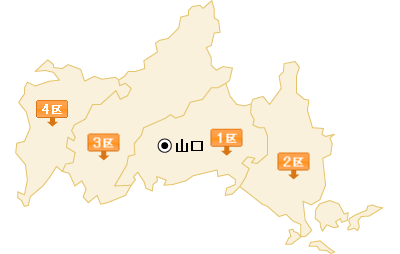The Chugoku regional block, at the western end of the island of Honshu, is comprised of Tottori, Shimane, Okayama, Hiroshima, and Yamaguchi prefectures. It benefited from LDP machine politics during the high growth years — and it has suffered as the economy has stagnated and as the region's population has shrunk. It is revealing that the late prime ministers Takeshita Noboru, Miyazawa Kiichi, Hashimoto Ryutaro, Sato Eisaku, and Kishi Nobusuke all had seats in the region: the sons of all three are running this year (two as incumbents), as is Abe Shinzo, great-nephew and grandson of the last two.
Not surprisingly, the region elects a total of thirty-one representatives, twenty for single-member districts and eleven in the proportional representation voting.
In 2005, the LDP won seventeen SMDs, the DPJ two, and Komeito and the PNP one each. In PR voting, the LDP won five seats, the DPJ three, Komeito two, and the PNP one. If anything the region was even more lopsided in 2003, when the LDP won eighteen SMDs and the DPJ two, with the LDP and Komeito combining for seven and the DPJ winning the remaining four PR seats.
However, in the 2007 upper house election, the DPJ won three of the block's four single-member districts, the reverse of the 2004 upper house election.
TottoriTottori has only two SMDs, not surprisingly given that it is the least populous of Japan's forty-seven prefectures with only 595,000 people according to the
2008 population survey.

The LDP has incumbents in both districts. In the first,
Ishiba Shigeru, agriculture minister in the Aso cabinet, defense minister in the Fukuda cabinet, and contender for the premiership in last year's LDP presidential election, faces
Okuda Yasuaki, a onetime secretary of Ishiba's and former Tottori prefectural assemblyman. Given Ishiba's past margins of victory, Okuda will have a hard time unseating his former boss.
In the second district, however, the race is more uncertain. LDP incumbent
Akazawa Ryosei won in 2005 by defeating independent
Kawakami Yoshihiro, who won as an independent in 2003, joined the LDP, then left again in 2005 as a postal rebel. Kawakami then joined the DPJ and won a seat in the upper house. The DPJ candidate this year is
Yuhara Shunji, a four-time prefectural assembly member and, as
his website makes clear, a farmer. The combined vote of Kawakami and then-DPJ candidate
Yamauchi Osamu vastly outnumbered Akazawa's. The question is whether Yuhara can win both candidates' votes this year.
The DPJ could win one of two seats in Tottori.
ShimaneShimane, also with only two seats, is the second least populous prefecture in Japan, coming out just ahead of Tottori with 725,000 people.
Hosoda Hiroyuki (first district), the LDP's secretary-general, won sizable margins in 2003

and 2005, and faces a new challenger, DPJ candidate
Komuro Hisaaki, a former Shimane assemblyman. Hosoda will be reelected easily, but it does bear mentioning the presence of prefectural assembly members among DPJ candidates, especially in this part of the country, which could make the DPJ more competitive in years to come.
In the second district, the LDP's
Takeshita Wataru faces the PNP's
Kamei Hisaoki, the PNP's secretary general. Kamei, one of 2005's postal rebels, previously represented Shimane's third district, which no longer exists. Takeshita, the brother of Takeshita Noboru, defeated Kamei by more than 55,o00 votes in 2005 — and if Kamei's and then-DPJ candidate Komuro's votes were totaled, Takeshita won by 20,000 votes, with the JCP's receving more than 10,000. Given the surprising victory of Kamei's daughter Akiko in the 2007 upper house election, however, Kamei may be able to win. The JCP is not fielding a candidate, and Kamei has the backing of the other opposition parties.
OkayamaOkayama has five districts, making it the block's second largest prefecture behind Hiroshima. Amazingly, the DPJ's position in Okayama actually improved from 2003 to 2005, as two DPJ candidates won in 2005 while none won in 2005.
Tsumura Keisuke (second district) first ran in 2003 when he finished within 10,000 votes of the LDP incumbent
Kumashiro Akihiro and won a PR seat. Kumashiro voted against postal privatization in 2005, but he did not run in the district, resulting in a head-to-head battle between Tsumura and
Hagiwara Seiji, which Tsumura won by 2,000 votes. This time, however, the field is divided. Tsumura faces LDP candidate Hagiwara, PNP candidate
Akamatsu Kazutaka, and Kumashiro, running as an independent. This is the only district in the country where PNP and DPJ candidates will go head to head. Tsumura probably has the upper hand on the basis of his incumbency and the DPJ's national strength, but it should be a close election regardless.

Okayama's fourth district, once the district of the late
Hashimoto Ryutaro, is now represented by the DPJ's
Yunoki Michiyoshi, who won the seat by 6,000 votes in 2005 over this year's LDP candidate
Hashimoto Gaku, second son of the late prime minister. Having won in 2005 despite the Koizumi landslide, Yunoki should be safe this year.
The LDP should be safe in the first district, where
Aisawa Ichiro faces DPJ challenger
Takai Takashi, a former internal affairs ministry official. Aisawa doubled up the DPJ candidate in 2005, and should emerge victorious again.
The LDP's situation in the fifth district is more uncertain:
Murata Yoshitaka, the winner in 2005, defeated DPJ candidate
Hanasaki Hiroki, by roughly 50,000 votes, but due to the LDP's Costa Rica system will be running as a PR candidate. In his place the LDP is running
Kato Katsunobu, who won PR seats in 2003 and 2005. The substitution of Kato for Murata could swing the election to Hanasaki.
Finally, in the third district,
Hiranuma Takeo, leading postal rebel who is hoping to build a conservative "third pole" in the political system, is running for reelection in a field with the LDP's
Abe Toshiko, who he defeated by 40,000 votes in 2005, and the DPJ's
Nishimura Keito. It is likely, however, that the field will split as it did in 2005, perhaps with Nishimura finishing in second ahead of Abe.
The DPJ could win three of five seats in Okayama.
HiroshimaHiroshima, with seven districts, is the largest prefecture in the block. The LDP won six of seven seats in 2005 and 2003; in 2005, the one non-LDP seat was won by the PNP.
Accordingly,
Kamei Shizuka (sixth district), the head of the PNP, should win reelection easily.
The DPJ's best chances to pick up seats are in the second district, where
Matsumoto Daisuke,

winner in 2003, should be able to reclaim the district from the LDP's
Hiraguchi Hiroshi, helped by the absence of a JCP candidate (Matsumoto lost by 17,000 votes and won a PR seat); and the fifth district, where the LDP's
Terada Minoru, who first won the seat in 2003, faces the DPJ's
Mitani Mitsuo for the third time. Mitani, a former finance ministry official, lost by 6,000 votes in both 2003 and 2005, winning a PR seat in 2005.
Safe LDP incumbents include
Kishida Fumio (first district), facing the DPJ's
Sugekawa Hiroshi for the second time, and
Nakagawa Hidenao (fourth district), who faces the DPJ's Soramoto Seiki for the third time.
Miyazawa Yoichi (seventh district), son of the late Miyazawa Kiichi, may be vulnerable: for the third time he faces the DPJ's
Wada Takashi, a former finance ministry official, who lost by 18,000 votes to Miyazawa in 2003 and 2005, winning a PR seat in 2003. With the JCP, which received 14,000 votes in the district in 2005, not running a candidate, Wada could defeat Miyazawa.
The LDP may also be vulnerable in the fifth district, another district where a victorious incumbent from 2005 will run as a PR candidate due to the Costa Rica system. LDP candidate
Masaharu Yoshitake last won the seat in 2003, when he defeated an SDPJ candidate by more than 50,000 votes. This time, however, he faces former bureaucrat
Hashimoto Hiroaki, who placed second in a field that also included an independent who received nearly 32,000 votes and an SDPJ candidate who received 26,000 votes, as well as a JCP candidate and another independent who combined for more than 10,000 votes. Hashimoto should win the seat.
In Hiroshima, the DPJ should win four, the LDP two, and the PNP one.
YamaguchiFinally, in Yamaguchi, the LDP won all four seats in 2005, three of four in 2003, and the prefecture's upper house seat in 2007. It did win back one seat in a by-election in 2008.

The LDP has strong incumbents in former Foreign Minister
Komura Masahiko (first district); Chief Cabinet Secretary
Kawamura Takeo (third district); and former Prime Minister
Abe Shinzo (fourth district).
The DPJ lost the second district in 2005, but
Hiraoka Hideo, who won the seat in 2000 and 2003 before losing by 1,000 votes in 2005 and settling for a PR seat, won it back in the 2008 by-election to replace 2005 winner Fukuda Yoshihiko, who was elected mayor of Iwakuni. Hiraoka should be reelected comfortably, keeping the status quo in place in Yamaguchi.
Proportional representationOnce again using the
d'Hondt method simulator,
Yomiuri's
latest polling data, and
turnout data from 2005, the best the DPJ can do is six seats to the LDP's three, with the PNP and Komeito each taking one. Given that it is unlikely that the DPJ will poll as strongly in PR voting in Chugoku as it will elsewhere, five seats is probably more likely, perhaps with Komeito gaining a seat in the process. A more likely outcome is therefore DPJ five, LDP three, Komeito two, PNP one.
Accordingly, the DPJ can win fourteen seats in Chugoku, the LDP eleven, the PNP three, Komeito two, and independent Hiranuma Takeo one.






